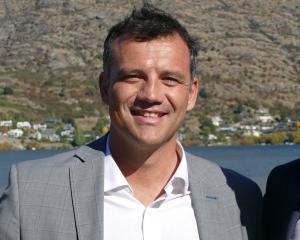
Let us imagine that when we wake up on October 15, that National Party leader Christopher Luxon is in a position to be able to form a government. What happens next?
If you were at the Business South gathering yesterday at which Mr Luxon was asked, and answered, this question, you may want to skip down a few paragraphs at this point. Otherwise, his response was an interesting glimpse of a future which may or may not come to pass.

But scrapping fair pay awards and income insurance plans, restoring interest deductability for rental property, rolling back Three Waters legislation and reversing any RMA reform which may have been passed pre-election were starters on Mr Luxon’s bill of fare for the nation.
More broadly, Mr Luxon wanted two of the main sectors — business and the community — to come to government and tell it what changes they needed to see enacted.
Claiming National would be carrying out a "turnaround" job in the wake of Labour’s economic performance, he promised no great spending other than in education and health, and a great deal of pruning of government expenditure. Quite who will do that work, given National also plans cutting the public service, is a moot point.
Mr Luxon also hinted that Cabinet ministers will be regarded somewhat as junior executives and given KPIs to meet each quarter, which would come as somewhat of a shock to people on either side of the desk, as would his assertion that ministers should be measured on results, not money spent.
Meanwhile, earlier
The main event of Mr Luxon’s visit was earlier in the day, when National finally came off the fence and gave a definitive answer about what it would do with the new Dunedin hospital.
For months now its Dunedin list MP, Michael Woodhouse, has been decrying cuts and clawbacks to the project, but has not responded when asked the natural follow-up: "So what would your party do about it?" The answer, as of yesterday, is reverse them.
The reluctance to commit to that course of action has been somewhat understandable: the project’s costs continue to soar and National’s prospective finance minister, Nicola Willis, will have baulked at signing a blank and potentially very much more expensive cheque. That policy void has proven a handicap for Mr Woodhouse though, who has not been able to mount as fierce an attack as he might have liked to so far on the Government on the issue .
In the scheme of things the $30 million National estimates it would take to reverse the cutbacks from the project’s detailed business case is not large, although it feels a somewhat heroic assumption given the ever-increasing cost to build the new hospital and never decreasing impact delays and inflation are having on that cost.
That may also explain National’s hesitancy to immediately commit to building the Interprofessional Learning Centre, which was meant to stand proudly at the centre of the development.
Although a swarm of emeritus professors of medicine have written to the Otago Daily Times asserting how vital it is that one be built, and despite Mr Luxon having made an extensive and expensive commitment to expand medical education in New Zealand earlier in the week, he passed that question off to Mr Woodhouse, who would not be drawn on it.
"We are committed to the IPL over time but the really important thing is for the Government to work to ensure that the tertiary education institutions get back on a firm financial footing. The best way to do that is to control inflation, to get better projections of future financial viability and to get international students back.
"Yes, it’s still very much in our thinking, but today is about the hospital."
However, Mr Luxon was quite prepared to back himself regarding his commitment to open a third medical school in the Waikato. If you did not live in Otago this would seem to be a terrific idea, but the last time this scheme was hatched it was well and truly stomped on by the existing medical schools, which fear a third institution competing for the brightest and the best would come at their expense.
"The third medical school is a critical game changer — we need more doctors," Mr Luxon told the ODT.
"We are 1700 doctors short, we have 350 New Zealanders starting study in Australia who could be studying here in New Zealand but the cap has been too small ... It is the perfect time for us to open up a third medical school. It’s not about competition between Auckland and Otago or Waikato, it is about growing the pie of doctors for New Zealand."
Mr Luxon’s pie comes with a dollop of cream for the universities of Otago and Auckland, a guarantee of funding for extra medical students, a bet which takes Labour’s proffered 50 more placements and doubles it.
It is a naked electoral gamble: National is far more likely to win both Hamilton seats than both Dunedin seats, or Auckland Central for that matter, and hopes this will further that aim. Whether it is a good idea educationally is another question entirely.
But we will all have to wait for the dawn chorus of October 15 to know if there is any chance of it becoming a reality.












